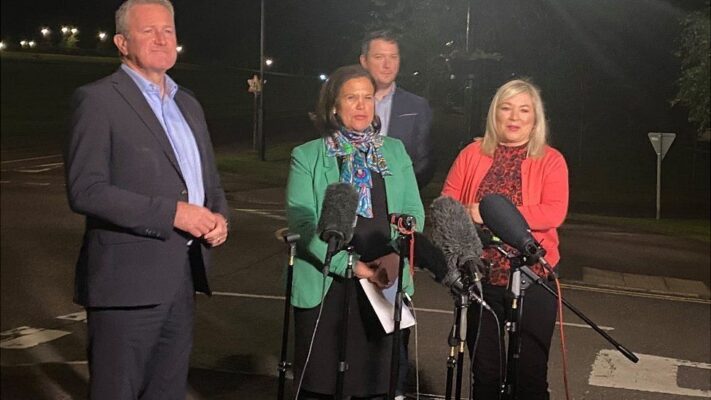
Sinn Féin’s Mary Lou McDonald said Irish speakers had been waiting for 15 years for basic rights and recognition
NI Secretary Brandon Lewis said the DUP and Sinn Féin intended to nominate at the “earliest opportunity”.
It comes as the UK government says it will legislate for language protections if the Stormont executive does not.
The legislation was part of the deal that restored power-sharing last January.
Sinn Féin had said it would not support a new Democratic Unionist Party (DUP) first minister unless the UK government passed the legislation.
When Arlene Foster stood down as first minister on Monday, Sinn Féin’s Michelle O’Neill also lost her position as deputy first minister because the roles are a joint office.
The DUP has named Paul Givan as its pick to replace Mrs Foster, while Sinn Féin said Ms O’Neill would resume her post as deputy first minister.
It is understood the Stormont business committee could meet at short notice to try and arrange a special sitting on Thursday to nominate a first and deputy first minister.
Talks at Stormont continued late into Wednesday night, with Sinn Féin returning just before midnight to resume negotiations with the NI secretary.
The meetings came amid a stand-off between Sinn Féin and the DUP over the appointment of a first and deputy first minister, and the introduction of Irish language legislation provided for in the New Decade, New Approach deal.
The deal includes an Office of Identity and Cultural Expression, an Irish language commissioner and a commissioner to enhance and develop the language and culture of the Ulster-Scots/Ulster-British tradition.
Mr Lewis said he was “disappointed” the Stormont executive had not brought Irish language legislation forward in the assembly.
“However, following my intensive negotiations with the parties over the last few days, I can confirm that if the executive has not progressed legislation by the end of September, the UK government will take the legislation through Parliament in Westminster,” he said.
“If that becomes necessary, we will introduce legislation in October 2021.”
Ms McDonald said Irish speakers had been waiting for 15 years for basic rights and recognition.
“This is important for Irish language speakers and for wider society because power-sharing is based on inclusion, respect and equality,” she said.
“On this basis of what has been agreed I am happy to confirm that Sinn Féin will nominate Michelle O’Neill as deputy first minister and will participate fully in the five-party executive.
“We have a huge amount of work ahead of us as we come out of Covid and as we continue to rebuild the economy, get people back to work and tackle hospital waiting lists.”
Taoiseach Micheál Martin warmly welcomed the news.
“I look forward to working closely with the first minister and deputy first minister,” he said.
“We share significant challenges ahead to build economic and societal recovery as we emerge from the Covid-19 pandemic.
“There is much we can do together in terms of practical cooperation for the benefit of people across this island.”
The DUP left its meeting with the secretary of state without talking to the media, and has not yet commented on the latest developments.
Party leader Edwin Poots had previously said he intended to support Irish language legislation but not necessarily before the next assembly election.
The clock had been ticking with regards to nominating a first and deputy first minister.
Arlene Foster resigned as first minister on Monday, six weeks after she was overthrown as the leader of the DUP in an internal revolt.
That led to a seven-day deadline for the approval of a new first minister and deputy first minister, failing which the devolved executive would have collapsed, prompting fresh elections.
Tags:




